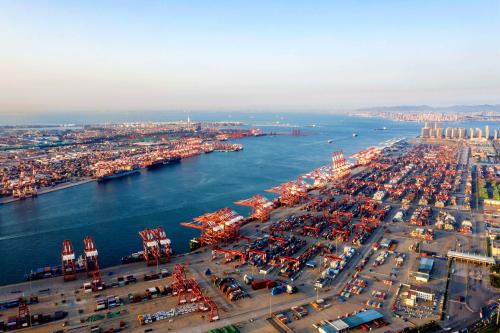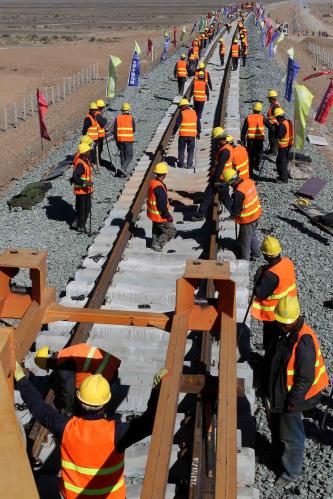This op ed was originally published by The Hill.
Since the Marshall Plan to aid European nations after World War II, the United States has led the Western world in a substantial and evolving international assistance effort to work with other nations to grow their economies, protect their people from deprivation, and promote human rights and democracy.
Over the course of this work, the U.S. and other democratic nations have learned many tough lessons. For example, we have learned that grant assistance has many fewer drawbacks than loans, which can be a huge burden on the recipient government. We have learned that transparency and accountability are necessary elements to a sustainable and effective aid program. We have learned that engagement and ownership by local stakeholders is necessary for a successful intervention.
Just as critically, we have learned that American programs should be harmonized with efforts by other nations to help the developing world—or we will get in each other’s way to the detriment of the recipient nation—and through collaboration we can leverage one another’s assets. To this end, we have established formal international bodies that monitor, measure and grade development assistance programs, such as the Development Assistance Committee (DAC) of the Organization for Economic Co-Operation and Development (OECD).
In several key respects, BRI directly undermines the values of transparency, accountability, and local ownership that are the pillars of American and other Western economic development programs.
When the Cold War ended, these lessons and values were applied to the remnants of the Warsaw Pact countries. The Western model of accountable and transparent foreign assistance prevailed without challenge. Now, with the rise of China as the world’s second-largest economy and burgeoning donor, that no longer is the case.
China has begun its own foreign assistance program known primarily through its Belt and Road Initiative (BRI), which spends massively in dozens of nations throughout the developing world —up to $1 trillion over the past few years—which dwarfs American and Western official development assistance. While addressing critical infrastructure needs, BRI has been criticized appropriately for merely being an extension of China’s national security strategy, designed to push back on the influence of Western governments in the Indo-Pacific and beyond, clearing the way for a more dominant Chinese presence.
There is another problem with the initiative that ultimately may be profoundly more damaging to U.S. values and interests. In several key respects, BRI directly undermines the values of transparency, accountability, and local ownership that are the pillars of American and other Western economic development programs.
Because China does not provide accurate data on its program and does not participate in the OECD-DAC, it can be difficult to measure Chinese inputs. What we do know is not encouraging.
BRI relies on loans to developing nations, the terms of which are not transparent. According to the National Bureau for Economic Research, China’s loan terms are not disclosed, resulting in “hidden loans” that can “distort policy surveillance, risk pricing, and debt sustainability analyses.” This is anathema to Western development models, which recognize the hard lesson of the past 75 years that for assistance programs to actually lead to positive results in recipient nations, transparency is essential.
Too often, China’s BRI projects are built without regard to the impact on the local economy, politics, and the values of human rights and democracy, and most often with minimal local participation. Corruptible elites are strengthened while vulnerable populations are disregarded.
The incoming Biden administration has an opportunity to address this challenge in three important ways. First, with renewed U.S. leadership and participation in multilateral bodies, the United States can encourage China to adopt international standards and make Belt and Road compliant with development principles that actually benefit the recipient nations instead of damaging them. Working through international fora and like-minded development partners to highlight the harm caused by the opaque and unaccountable practices would be a terrific use of America’s newfound credibility on the international stage.
Second, the Biden administration can prioritize a more robustly funded economic development program. The U.S. has a number of effective aid programs in the health, education, democracy, and humanitarian sectors, but programs to build equitable economic growth—an essential backbone of all other programs—have withered over time. In 2020, the U.S. will spend only $3.4 billion on economic programs, roughly a tenth of our total aid program. This critical component should grow over the next four years to be at least one quarter of all aid programs. Robust funding is necessary to bolster the economies of developing nations and prevent governments from being tempted by the chimera of Chinese foreign assistance, or at least demand more accountability and transparency from BRI projects.
Finally, the Biden administration should examine the mixed record of the Trump administration on foreign assistance with a tough eye and a willingness to keep policies and programs that have proven effective. A coherent, holistic approach to the Chinese model of foreign assistance is required. The new International Development Finance Corporation, a bipartisan creation of Congress, in collaboration with USAID and the development finance institutions of other donors, can be an important component of a positive U.S. agenda to offer an alternative to BRI.
In the developing world, we have invested too much for too long and learned too many difficult lessons to let a less productive and effective model prevail.








Commentary
Op-edBiden must make China more accountable for its Belt and Road Initiative
January 7, 2021